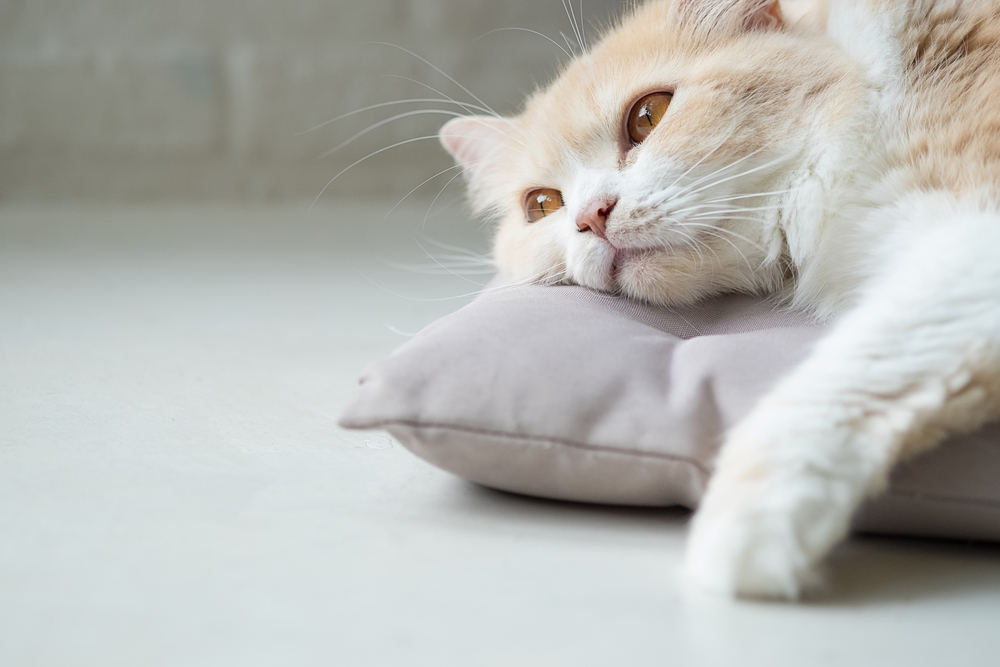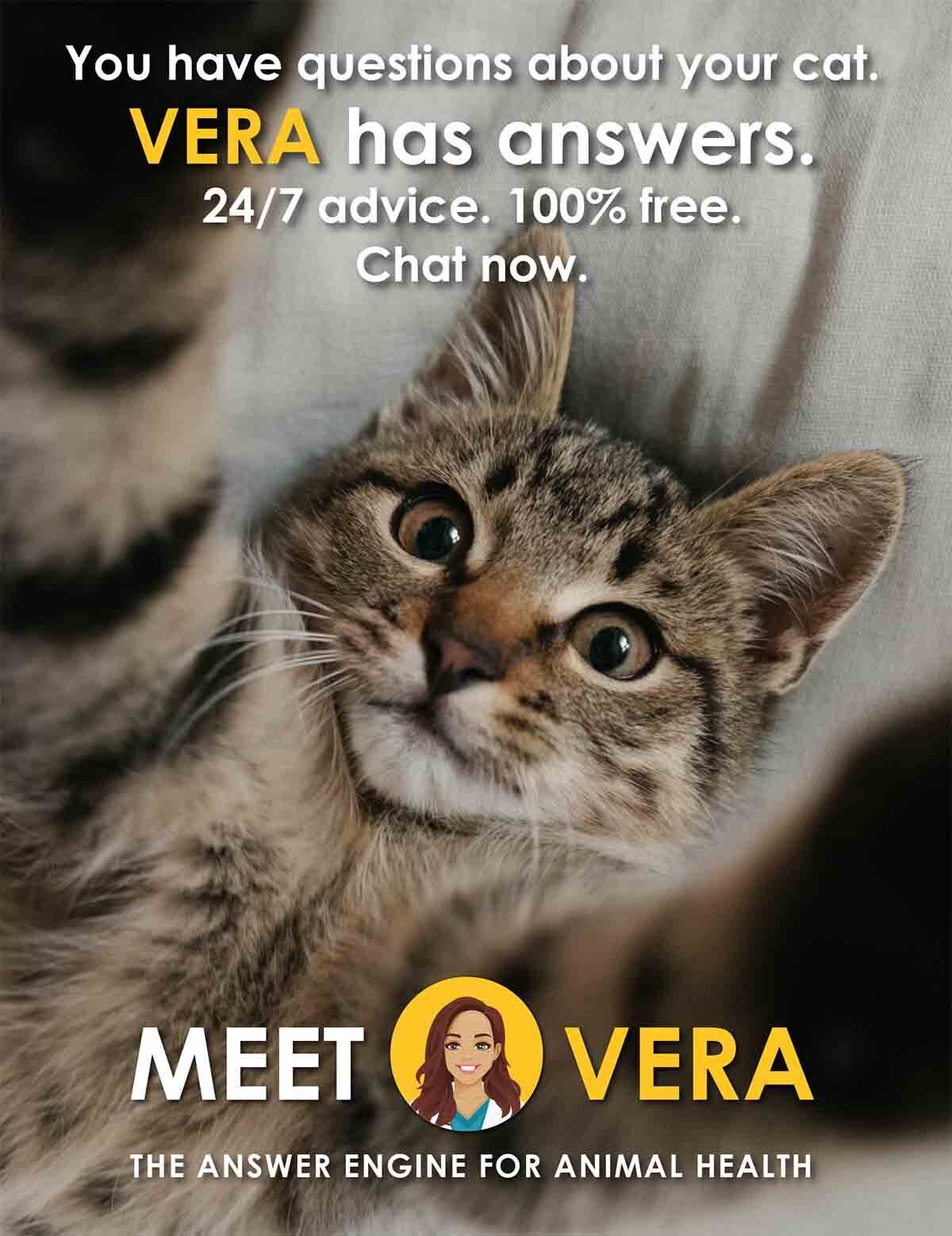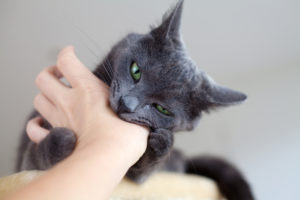If your cat is vomiting, then you are likely worried about whether he is truly sick, or just has an “upset stomach.” For more about whether you should consider veterinary care for your vomiting cat, see our article on “Causes of Cat Vomiting” and chat with an AskVet Veterinarian!
Sometimes, your cat’s vomiting can be resolved with a bit of TLC and some care at home. This is especially true if it turns out your cat is vomiting because he ate something he shouldn’t have that has caused him to feel temporarily nauseous—but cats with serious illness WILL NOT get better with home care.
My Cat Just Vomited…Should I be Concerned?
This is one of the most common reasons kitty parents chat in to AskVet! In general, you SHOULD be concerned and consider veterinary care IF:
-
- You suspect your cat may have swallowed a non-food item or a toxic substance
- Your cat is not using the litterbox normally (this includes straining to urinate, being unable to pass urine, or urinating/defecating outside of the litterbox)
- Your kitty is also acting like he feels sick: hiding from you, being less social (or in some cats, more “clingy” than usual), walking slowly, or is not as responsive as he normally is to favorite toys or cuddles
- Your cat is also having diarrhea
- There are multiple episodes of vomiting over a short period of time
- Your cat is not willing to eat for longer than 24 hours, or is drooling (a sign of severe nausea)
- Your cat is a young kitten (less than six months old), since he can become dehydrated VERY easily—creating an emergency situation
If none of these scenarios apply to your vomiting cat, then phew—your kitty may be eligible for home care!
How Do I Help My Vomiting Cat at Home?
First things first: think back and consider WHY is my cat vomiting? Is she grooming more frequently and swallowing lots of her hair—that has come out in a hairball? Or did you recently run out of her favorite cat food and switch food types all of a sudden? Have you seen her playing and chewing on a toy that is now missing? Or does she go outside and may have eaten something (like a prey animal or toxic substance)?
If you have recently changed your cat’s diet, fed your kitty a new treat, or given her some human food off your plate recently, then her stomach may just need a bit of rest and relaxation (so to speak!) to get back to normal. Cats have very sensitive stomachs and sometimes do not tolerate a sudden change in their diet, leading to vomiting. If you are changing your cat’s food, it’s important to GRADUALLY mix the new food in with the old food over about a week’s time to avoid an upset stomach.
The one exception to that rule is when you need to start a special diet to help your cat recover from vomiting. If your precious purrbox is otherwise acting like her normal self and has started vomiting, you can try offering her a bland diet for a few days to let her system take a break.
Bland/Easily-Digestible Diets
You may have heard of feeding dogs with an upset tummy boiled chicken and rice to settle their stomach. Did you know you can also use this to soothe a cat’s rumbling tummy, too? The only difference is that cats need VERY FEW carbohydrates compared to dogs—so the ratio of ingredients is a bit different.
You can feed your cat a mixture of 90% boiled chicken and 10% rice for a few days, in small amounts at a time (think in terms of tablespoons, not cups!). If your kitty doesn’t like rice, then you can eliminate it altogether for a pure protein bland diet of boiled chicken. Make sure the chicken is skinless and free of spices, oil, butter, and seasoning.
If your kitty has an intolerance for poultry, or just doesn’t care for chicken, then you can offer her some canned tuna—just make sure it’s in water, not oil (since the fatty oil may make her symptoms worse). Alternatively, you can boil some LEAN ground beef or ground turkey—just make sure to skim the fat off the top and let it cool before serving small amounts to your cat.
My Cat is Such a Picky Eater—What Else Can I Offer Him?
For cats who turn their nose up at the above bland diet, there are several safe flavor-enhancers you can mix in—like a few teaspoons of low-sodium chicken, beef, or bone broth. Another commonly-enjoyed bland food that is safe to mix in with the bland diet is meat-based baby food—yes, that’s right! You can feed your cat small amounts of beef, chicken, turkey, or ham baby food found in your local supermarket.
AskVet Tip: You may have heard that onions and garlic are toxic for cats—and this is true! Most broths and meat-based baby foods will list these ingredients on their packaging, but the amount of onion and garlic in these products is such a tiny amount that it is NOT going to be toxic for your cat in small amounts.
If your cat is happily eating the bland diet and otherwise acting normally, then continue to feed the bland diet for 48 hours (or until your cat has been vomit-free for at least 24 hours), before GRADUALLY mixing in his normal food over several days.
If your cat is NOT eating, if the vomiting continues for longer than 48 hours, OR if any of the other symptoms we listed as concerning pop up—then your cat should be seen by a veterinarian in person as soon as possible.
What About Over-the-Counter Medications?
Cat parents frequently ask us about giving a vomiting cat over-the-counter medicine. It’s important to realize that many of these medications are NOT safe for cats and are outright toxic (like Pepto Bismol). In other cases, medications may be dangerous for your cat depending on the underlying reason for their vomiting.
For these reasons, it is NOT safe to administer your cat ANYTHING over-the-counter unless it is on the advice of a veterinarian who has examined your cat in person. Please DO NOT give your cat ANY of the following: Pepto Bismol, Pepcid A/C, Miralax, olive oil/other plant-based oils, Zantac, or anything else without advice from your family veterinarian.
My Cat is Still Vomiting—What Can I Expect at the Vet?
If your cat is showing other symptoms in addition to vomiting, has vomited multiple times in a short period of time, or continues to vomit in spite of feeding a bland diet at home, then your kitty should see her veterinarian. In some cases, this means taking your cat to an emergency clinic. Your AskVet veterinarians are standing by 24/7 to help you make these decisions for your cat—so please chat with us any time!
As always, your cat’s veterinarian will start with a thorough physical exam. This includes evaluating his level of dehydration, whether he has any abdominal pain, listening to his heart and lung sounds, and looking for any other hints as to the cause of your cat’s vomiting. Next, your veterinarian will make recommendations on how to help your kitty feel better, and tests to look for causes of your cat’s upset stomach.
Symptomatic Treatment to Make Your Cat Feel Better
We all know how miserable it feels to be nauseous, and your cat is no different! Your veterinarian will often give anti-nausea medication to help settle his stomach as a first-line treatment. This medication is often given first by an injection in the vet’s office, since your veterinarian wants to make sure the drug is absorbed (and not vomited up if given by mouth!). This may be followed with nausea pills to be given at home, and your veterinarian may also add antacid medications, a nutritionally-balanced bland diet, and/or probiotics to re-balance the good and bad bacteria in your cat’s gastrointestinal tract.
Often, cats who are vomiting are also dehydrated. This is due to both loss of fluid in the vomit itself, and the lack of fluid intake if your cat is not eating or drinking normally. Depending on how dehydrated your cat might be, your veterinarian may give your cat a fluid pouch under the skin (“subcutaneous fluids”), which is absorbed over several hours to re-hydrate your cat and allow you to take him home. In cats with severe dehydration, your veterinarian will recommend hospitalization and fluids to be provided directly into your cat’s vein (“IV fluids”).
Specific Treatment for the Cause of Vomiting
Since there are hundreds of possible causes of cat vomiting, your veterinarian will likely recommend some testing to start narrowing down the list of causes in your cat’s case—and also evaluate whether specific treatment is needed to address the underlying cause of your kitty’s illness.
These tests include bloodwork and urine testing to look for problems with blood sugar and your cat’s internal organs, including her liver, kidneys, electrolyte levels, protein levels, white blood cells, and thyroid levels—just to name a few! A stool sample may be analyzed for the presence of intestinal parasites, which are easily cured with specific medication. Imaging of your cat’s abdomen with radiographs (x-rays) or an abdominal ultrasound may also be recommended to evaluate for signs of a blockage, inflammation of the pancreas, or other diseases.
If your veterinarian finds a specific reason for your cat to be vomiting, then further treatment will aim to fix the problem. For example, it may be that your cat is vomiting from hyperthyroidism and needs thyroid medication, or he may be diabetic, or she may have a urinary tract infection that needs antibiotics. In some cases, surgery may be recommended to remove a non-food object causing a blockage, or obtain biopsy samples, or to fix a gallbladder problem.
As you can probably tell, the home remedies for cat vomiting depend on the severity of your cat’s current condition, as well as if any underlying causes are found. The best outcome? A cat whose test results are all normal and who feels better with just symptomatic treatment!
Hoping For The Best!
While some cases of mild vomiting will resolve on their own with the above recommendations, always remain vigilant while your cat is not feeling well! Our veterinarians at AskVet are an excellent resource for triage and assistance with interpreting your kitty’s condition and symptoms if you are not quite sure if he needs veterinary help in person.
Our AskVet Veterinarians are available to discuss all of your pet’s needs 24 hours a day, 7 days a week. Whether you have an immediate need or are looking to improve your pet’s overall wellbeing, just sign into your account and one of our friendly and knowledgeable veterinary experts will attend to your needs, no appointment required!








